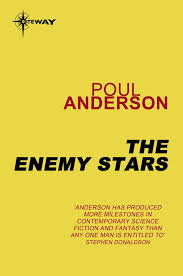See Alien Views Of Mankind.
Poul Anderson's own view of governments becomes evident when he articulates alien viewpoints. Having read an Ythrian account of "nations" in the above-linked post, we learn how an Arvelan defines "Officials":
"Not parents, not tribal elders, not Speakers for an Alliance or their executive servants - no, agents of that huge bloodless organization called a "government," which claims the right to slay whomever resists the will of its dominators."
-"The Ways of Love," (p. 126) (see the above link).
Apart from being slain, we can be fined, imprisoned or given community service but usually we just vote, pay taxes and observe laws. However, the state does indeed claim a monopoly on violence and is capable of waging wars that are far more destructive than the crimes committed by some of its terrorist opponents. A bomb in our capital city? A terrorist atrocity. The bombing of a foreign city? An act of war.
We will get beyond it (I think).

1 comment:
Kaor, Paul!
I'm skeptical that ALL aliens will be quite as libertarian leaning as these Arvelans (I think "Arvelan" is better than "Arvelian"). But, yes, these comments indicates his own view of the state in his more libertarian moments. BUT, Anderson also knew the state was a necessity, considering how flawed and imperfect human beings are. A clear example of this from his works being Chapter XXI of OPERATION CHAOS, after first criticizing the state/Establishment: "And yet...and yet...it's the only thing between us and the Dark Ages that'd have to intervene before another and probably worse Establishment could arise to restore order.
And don't kid yourself that none would. Freedom is a fine thing until it becomes somebody else's freedom to enter your house, kill, rob, rape, and enslave the people you care about. Then you'll accept any man on horseback who promises to bring some predictability back into life, and you yourself will give him his saber and knout."
And it's in MILDER states like the UK and US that ordinary people can vote and have some say (if they wish, of course) in political affairs. And that is by no means the actual case in many nations. Also, it is right that the state have that monopoly of violence, else we would have to go back to using feuds, vendettas, negotiating weregilds, etc, for handling crime, violence, and disputes. And "acts of war" occurs when states are unable or unwilling to resolve quarrels by means short of violence. And I see no reason to think any of that will ever change.
Sean
Post a Comment